Three-Day International Conference
on
“Power of Media in a Globalising World”
&
IOS Fourth Lifetime Achievement Award
October 14-16, 2011
Town Hall / Yuvanika, Bangalore, Karnataka (India)
Organised by
Institute of Objective Studies
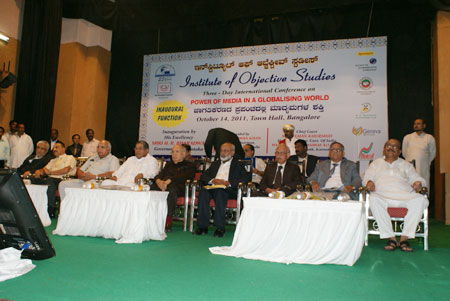
Inaugural Session
R-L: Mohd. Obaidulla Sharieff, Convenor of the Three-day International Conference; Prof. Z.M. Khan, Secretary General of IOS; Prof. B. Sheikh Ali, a famous historian from Karnataka; Dr Mohammad Manzoor Alam, Chairman of IOS; H.E. H R Bhardwaj, Governor of Karnataka; Mr K Rahman Khan, Deputy Chairman of the Rajya Sabha; Prof. (Dr) Vinaysheel Gautam, founding director IIM (K) and professor and head of management studies IIT (Delhi); Mr. Abdul Azim, MLC and Mr. Aga Sultan, Joint Convenor
Decides to consider IOS chapter Bangalore. Historian B. Sheik Ali gets IOS Lifetime Achievement Award. Dr Alam says it will have “far-reaching” impact.
Bangalore, October 14: The inaugural session of the three-day conference on the “Power of Media in a Globalising World” began with a recitation from the holy Quran. The Secretary General of IOS, Prof. Z.M. Khan, followed with an introduction of IOS and its year-long Silver Jubilee celebration programmes, a part of which this conference was.
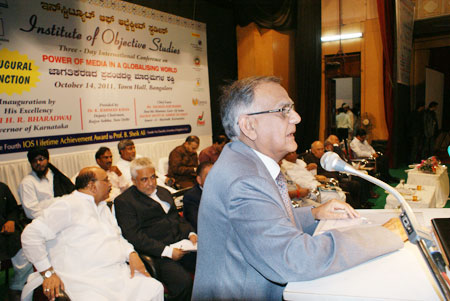
Introduction of IOS: Prof. Z.M. Khan, Secretary General of IOS
Prof. Khan said IOS specialised in research and publication, “creating a meditational space” between ulama and intellectuals and was working in collaboration with Union and state government departments.
He added that IOS also worked with other NGOs in areas of research and advocacy, its perspective being an Islamic worldview and regard for the Constitution of India and its “ideals, spirit and values.”
The IOS Chairman, Dr Mohammad Manzoor Alam, in his short “A Few Words” address, introduced the themes of the conferences to be held at different locations all over the country in the coming six months.
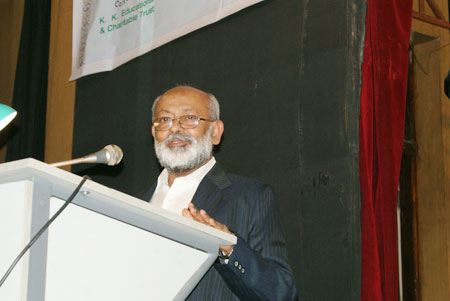
A Few Words: Dr Mohammad Manzoor Alam, Chairman of IOS
He made a case for giving “voice to the voiceless and a face to the faceless,” and argued for the empowerment of these people, who constitute 70 percent of the country’s population.
In his presidential address the Deputy Chairman of the Rajya Sabha, K Rahman Khan, congratulated IOS for its “work for future generations” and congratulated Dr Alam for leading this organisation for a quarter century. IOS had brought people of different castes, religions, ethnicities and political persuasions together.
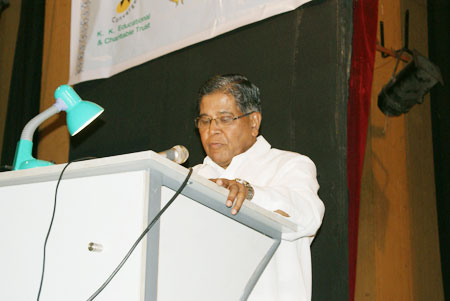
Presidential Address: Mr K Rahman Khan, Deputy Chairman of the Rajya Sabha
He expressed unhappiness with the media, which according to him, was not distinguishing between subjective perceptions and objective reality. The media’s mixing up of news with views led to misrepresentation, Mr Khan said. He advised the media to adhere to norms.
Historian B. Sheik Ali was conferred the 4th IOS Lifetime Achievement Award by Karnataka Governor H R Bhardwaj. The award carries Rs. 1 lakh, citation and a shawl.
Mr. Khan congratulated the IOS for its choice of Prof. B. Sheik Ali as the recipient of the fourth IOS Lifetime Achievement Award.
The guest of honour Prof. Vinaysheel Gautam of IIT Delhi pointed out that news was not a commentary and should thus be distinguished properly for the sake of credibility of the media.
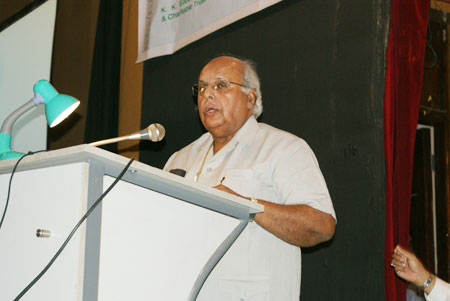
Guest of Honour: Prof. (Dr) Vinaysheel Gautam, founding director IIM (K) and professor and head of management studies IIT (Delhi)
He said, echoing a familiar complaint, that media had become the message, instead of being a vehicle for conveying the message.
In his inaugural address, the Governor of Karnataka, Mr H R Bhardwaj, said, “We love the media because it represents our aspirations.”
Showing gratitude for the framers of India’s Constitution, he observed: “Our elders gave us a remarkable Constitution for the benefit of all of us,” and regretted that of late certain sections of the political class had been trying to deprive the minorities of their rights.
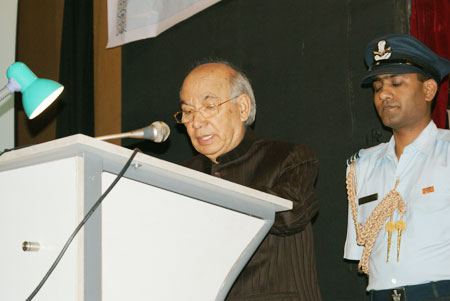
Inaugural Address: H.E. H R Bhardwaj, Governor of Karnataka
“Our weakness comes from inside us. Mahatma Gandhi was shot dead for pointing this out,” he said. “We have become dishonest and have been trying to deny our brethren their rights. The catholicity of spirit of our leaders like Maulana Azad and Pandit Nehru has gone.”
Governor Bhardwaj, referring to Team Anna’s attempt to force the country’s Parliament to do what it dictated, said that he was not convinced that an individual or a group of individuals were above Parliament, which was the repository of people’s sovereign authority.
He also dismissed the clamour of Sangh organisations for a uniform civil code as mere gimmickry. “All Personal Laws are scripture-based, and we are not supposed to change anybody’s scriptures.”
He mentioned the annual Phool Walon Ki Sair in Delhi, which celebrates the cultural diversity of India and the goodwill among people of different religious groups. Citing the virtues of Ganga-Yamuni Tehzib (the Hindu-Muslim composite culture), he said Muslims must get proper representation in education and jobs.
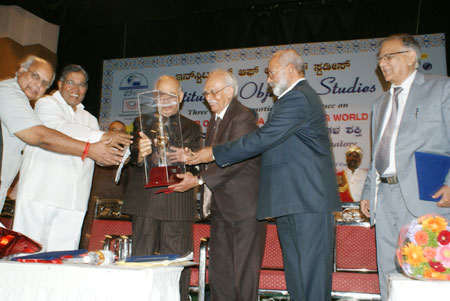
IOS Fourth Lifetime Achievement Award Ceremony
Prof. B. Sheikh Ali, Founder Vice-Chancellor, Universities of Mangalore & Goa and famous historian from Karnataka receives award by H.E. H R Bhardwaj, Governor of Karnataka
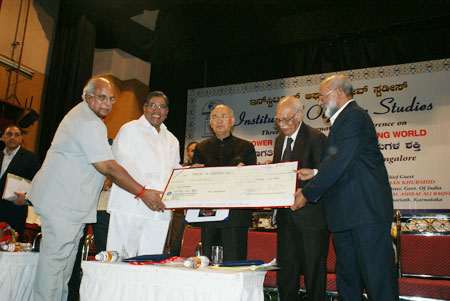
Presentation of cheque of 1 Lak Rupees to Prof. B. Sheikh Ali
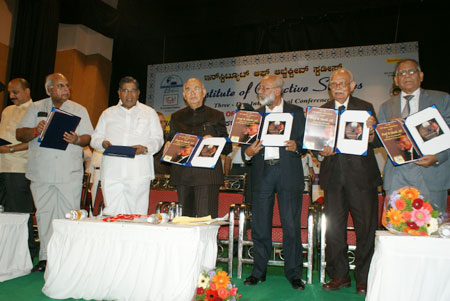
A view of Release of film on the contributions of Prof. B. Sheikh Ali

IOS Fourth Lifetime Achievement Award Ceremony presided over by Mr CK Jaffar Sharieff, former Railway Minister
(From L-R: Mr CK Jaffar Sharieff, Dr Mohammad Manzoor Alam, Prof. B. Sheikh Ali and Prof. ZM Khan)
In his address, former Railway Minister CK Jaffar Sharieff observed that IOS was a responsible organisation that had been working consistently for the empowerment of Muslims.
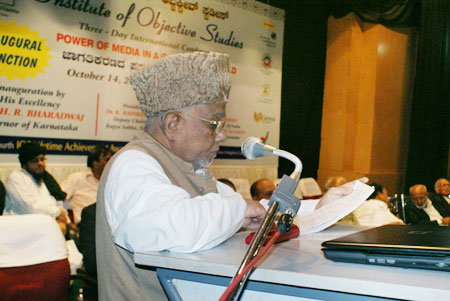
IOS Fourth Lifetime Achievement Award Ceremony: Mr CK Jaffar Sharieff delevers presidensial address
In his presidential address, former Railway Minister CK Jaffar Sharieff observed that IOS was a responsible organisation that had been working consistently for the empowerment of Muslims.
Mr. Sharieff advised the media to represent the interests of the rural poor. He also asked the Muslim youth to learn about their responsibilities, and the Muslim community to remain united.
At this point the IOS Chairman, Dr Mohammad Manzoor Alam, got up, walked up to the podium and announced that he was ready to launch a Unity Yatra with leaders of all sections of Muslims across Karnataka. He wanted to know whether the dignitaries on the dais and the audience supported the idea. Everybody, with a show of hand, expressed agreement.
In his acceptance speech, Prof. B. Sheikh Ali said that for him it was like a great moment of history. Waxing eloquent, quoting Shakespeare and other English poets in his speech, he talked about the “overflowing generosity” of IOS and Dr Mohammad Manzoor Alam.
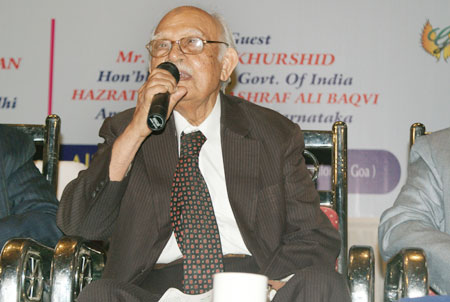
Acceptance of Award: Prof. B. Sheikh Ali
He said the IOS was trying to advance the cause of Sir Syed by spreading education. Prof. Ali said he admired the two great educationists–Sir Syed and Dr Zakir Hussein–along with the first education minister of India, Maulana Abul Kalam Azad.
He presented some pearls of wisdom from the Persian poet Sheikh Saadi and concluded with an advice from Sir Syed, “Capture the treasures of knowledge.”
Dr Mohammad Manzoor Alam responded by quoting from Iqbal:
Uth ke ab bazm-e-jahan ka aur hi andaz hai
Mashriq wa maghrib mein tere daur ka aaghaz hai
(Arise, the ways of the world have changed / It’s the dawn of rise of Muslims in East and West)
Then he recited another couplet:
Na lao zubaan par yaas ki guftagu
Ke Quran mein aaya hai latuqnatu
(Don’t ever utter words of despondency / The Quran asks us never ever to despair)
To Prof. B. Sheikh Ali’s words of advice to the Muslim community, especially the youth, Dr Alam added his own perspective: “Take light from the past, analyse the present and plan for the future. Muslims have not lost creativity and are not sterile. Protect and advance your heritage.”
Regarding Prof. B. Sheikh Ali’s suggestion to open a chapter of IOS in Bangalore, Dr Alam said that the decision to that effect was already taken.
Agha Sultan, Joint Convenor of the conference, proposed a vote of thanks.
DAY-II
(October 15, 2011)
The second day’s proceedings were divided into three business sessions. The first session, titled “Media and Democracy”, was chaired by Mr Azizulla Baig, formerly of the Indian Administrative Service.

Business Session-I
L-R: Mr Shafi Ahmed KO, Chennai; Mr. Azizulla Baig, IAS Retd.; Mr. Mohammed Zeyaul Haque, Senior Journalist, New Delhi; Mr. Raju Mansukhani, Senior Journalist and Consultant, New Delhi;
In his introductory remarks Mr Beg outlined the contours of the theme and initiated a meaningful discourse.
Mohammad Zeyaul Haque, a journalist, said the media derived its power from the constitutional value of freedom of speech and expression. With its constant struggles and sacrifices over the last three centuries it had established itself as the Fourth Estate, an informal but recognised status. Being able to speak for the people had given it tremendous power, which had corrupted it considerably. However, putting curbs on it (except under the laws of libel, decency and public order) would not work, as Pandit Jawaharlal Nehru had seen quite early. Nehru believed that it was better to tolerate some bad journalism than throttle the freedom of expression.
“With large inflow of foreign capital investment in Indian media, its independence and credibility can easily be subverted”, Mr Haque warned. This, he said, was the downside of globalisation as far as media’s moral authority was concerned.
Another journalist, Raju Mansukhani, who was speaking on “Globalisation, Media and Youth” said, globalisation had raised aspirations among the Indian youth tremendously, some of which could never be realised. That led to frustration, and worse.
Citing the case study of an IIT student, a young tribal woman who had committed suicide earlier this year, Mr Mansukhani said thanks to media hype about “sky is the limit” for IIT graduates and premises like a big home, an Audi or BMW car and other luxuries were there for the all-conquering youngsters to take was at the root of such human tragedies.
The second business session of the day, “Media and Minorities”, was chaired by Roy Wadia, a journalist presently working as Executive Director, Hero’s Project (on AIDS).

Business Session-II
L-R: Mr. Abdus Salam Puthige, Editor-in-Chief, Vartha Bharthi, Kannada Daily; Mr. Ahmad Hasan Imran, Editor, Qalam Weekly, Kolkata; Mr. A. Narayanan, Asst. Professor, Azim Premji University, Bangalore; Mr. Roy Wadia, Exec. Director, Hero’s Project India, Mumbai; Ms. Wasim Rashid, Editor, Chauthi Duniya Urdu, New Delhi; Mr. Khurshid Alam, Senior Hindi Journalist, New Delhi; Mr. Pradeep, Director, Pedestrian Pictures; Mr. Subhash Roy, Online Editor, EPW
Mr Wadia recognised the power and limitations of media and its immense potential for the good. He pleaded that weaker groups that felt frequently sidelined, misrepresented and denied adequate access to media should form their own small media outfits “to talk with each other” and strategise properly to find access to the larger commercially-operated media to communicate with the outside world.
Mr Wadia, who comes from one of the smallest religious minority groups–the Parsis–said such strategies did work. He cited the 12 years of his experience of work as a journalist with the CNN in the United States to vouch for the soundness of such an action plan.
Ahmad Hasan, editor of the Qalam Bangla weekly from Kolkata, presented what sounded like a litany of complaints against English and Bangla newspapers that seemed to be focusing too heavily and cynically on giving a negative picture of Islam and Muslims.
Mr Imran cited, among other instances of West Bengal’s English and Bangla newspapers’ prejudice against Muslims, their fierce resistance to the proposal of a branch of Aligarh Muslim University in the educationally backward Murshidabad district. “These newspapers said it would spread separatism and terrorism.” Even the august Anand Bazar Patrika was part of this campaign.
Another, rather hilarious but extremely toxic, was the chorus of West Bengal newspapers about a dadhi-topiwala (bearded and wearing a scullcap, the media’s Muslim stereotype) fellow being caught with a bomb-making formula in Urdu language (another scare-crow for such media). Xeroxed copies of the formula were distributed by the triumphant police to media persons at a press conference.
“We also wanted to know how a bomb was made and took a copy of this dangerous material which the police should not have distributed so widely in any case. After all, you never know who was going to put such material to what use,” Mr Imran chortled.
The anti-climax, however, was less theatrical. When Mr Imran got this piece of paper translated by an Urduwallah it turned out to be a receipe for making murabbah, the innocent fruit tart that tickles the Indian taste buds.
Mr Imran came to the really tragic part of this tragi-comedy (tragedy for Muslims, comedy for the media) being played by anti-Muslim media. When Mr Imran and his friends went with this piece of information to the newspaper offices which had published the dadhi-topiwallah’s dangerous bomb-making formula, they refused to publish the fact. “They were overzealous when it came to victimising the innocent, but not ready to look at the proof of the falsehood of what they had been claiming,” Mr Imran concluded. That was normal practice, according to him.
Wasim Rashid, a lady journalist, was the only representative of the other half of humanity among the speakers on the first day. Being a woman, and a Muslim for that matter, was double jeopardy, so to say, but she refrained from bringing a feminist perspective to the understanding of the issues.
Ms. Rashid, who edits Chauthi Duniya Urdu, a lively periodical that has sympathy for the weak and the marginalised, dwelt upon the uneasy situation of Muslim journalists–including big-ticket Muslim journalists–in English media (that see themselves as “national” media).
She enlivened the dreary environment, burdened by English language, with some exquisite Urdu poetry. The opening couplet could be loosely translated as, “(Never worry), we don’t carry weapons; what we carry is a mere pen.” That was a firm reiteration of a journalist’s peaceful intent as well as of the right to freedom of speech and expression.
In India’s national media Muslim journalists were helpless in correcting the anti-Muslim tilt in reporting and the generally adverse representation of Muslims in their content.
A.N. Narayanan, Assistant Professor of Azim Premji University, Bangalore, was of the opinion that the anti-Muslim bias of media may not be institutional, but a feature of its imperfect functioning.
Intervening in the discourse, Dr Mohammad Manzoor Alam said that Khurshid Alam was generalising two isolated events of issuing fatwas mindlessly to draw a principle out of them.
“The fact is that the milk-feeding fatwa was overwhelmingly rejected by other ulema, and the fatwa in India that a rapist became the legitimate husband of the victim was also opposed by a majority of ulema,” Dr Alam explained.
He pointed out that the Muslim complaint with the media about unfair representation of their issues was not merely a figment of their imagination, but a properly documented fact.
Subash Roy, online editor of Economic and Political Weekly presented a more nuanced picture of the situation and pleaded that the staff of media organisations should reflect the religious, caste and ethnic diversity of the country. At present, that was not the case, he observed.
On the other hand, Pradeep, Director Pedestrian Pictures, gave an analysis of how the media had been consistently stereotyping Muslims and presenting their image as the “hostile other.”
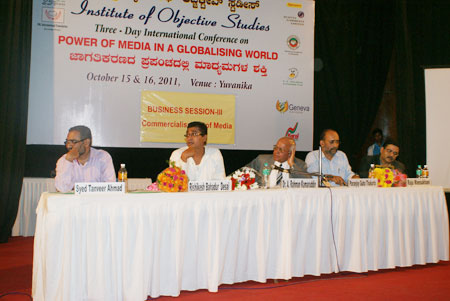
Business Session-III
L-R: Syed Tanveer Ahmad, editor, www.karnatakamuslims.com; Mr. Rishikesh Bahadur Desai, Principal Correspondent, The Hindu; Dr. Abdur Rahman Kamaruddin, Former Advisor, UNESCO, UNIDO and IDB; Mr. Paranjoy Guha Thakurta, Independent Journalist-Film Maker, New Delhi; Mr. Raju Mansukhani, Senior Journalist and Consultant, New Delhi
The next session’s theme was “Commercialisation of the Media,” and it was chaired by Dr Abdur Rahman Kamruddin, former advisor, UNESCO, UNIDO and IDB. He complained about commercialisation, but conceded that survival was at issue. Syed Tanveer Ahmad, editor, Karnataka Muslims, was the convenor.
In this session Paranjoy Guha Thakurta, an independent journalist and film maker from Delhi, made a dazzling presentation of the power play, agenda-setting and economics of the media.
However, like an evolving society or democracy, there were certain corrective processes that were also underway and an improvement was visible that would gather pace in years ahead. There was enough in it for us to love and as much of it to hate. His final remark: “You may love the media, you may hate the media, but you cannot do without it.”
Raju Mansukhani gave a detailed analysis of huge media operations and Rishikesh Bahadur Desai, principal correspondent of The Hindu made a hilarious presentation of the regional media’s shenanigans.
DAY III
October, 16, 011
The theme of the last day’s proceedings was “Media and Globalisation.” It was the fourth business session of the conference, and was chaired by Prof. Z.M. Khan. The convenor was
Mr S.N.H. Razvi, former Secretary of Karnataka State Minority Commission.

Business Session-IV
L-R: Mr. S. N. H. Razvi, Former Secretary, Karnataka State Minorities Commission; Mr. Paranjoy Guha Thakurta, Independent Journalist-Film Maker, New Delhi; Mr. Hameed Abdul Karim, Senior Journalist, Sri Lanka; Mr. Hisham Ahmed Awad Gaafar, Media Development Association, Egypt; Prof. Z. M. Khan, Secretary General, IOS, New Delhi; Mr. Roy Wadia, Exec. Director, Hero’s Project India, Mumbai; Ms. Bhasha Singh, Roving Editor, Nai Duniya, New Delhi; Mr. A Jairam, Former Resident Editor, The Hindu; Mr. Iftekhar Sharieff, Salar
Hisham Ahmed Awad Gaffar of Media Development Association, Egypt, talked about the role of social media in the uprising against the Mubarak regime and the peaceful moblisation of people for a better order.
Hakeem Abdul Karim, an intellectual from Sri Lanka placed the debate of Western media’s representation of Islam and Muslims within the colonial context. Stereotyping was part of the colonial project–the stereotype of the White Man as the warrior and savior,Tarzan and Lone Ranger–and the colonised as inferior, foolish and dangerous.
He referred to an article in Time magazine about “The Jehadi Next Door,” which was the reigning stereotype in the US and UK. All this was part of a larger foreign policy goal of the US and the European Union. In this context, Samuel P Huntington’s book, Clash of Civlisations, could be seen as a prelude to the current war on Islam.
He referred to another book which talked about the last Gulf War in complete detail and with great accuracy even if it was written several years before that war.
Mr Abdul Kareem said the US corporates, its Defence Department (Pentagon), its writers, journalists and the intelligence establishment were part of a huge machine that created the rationale for war and devised ways of sustaining it. That also involved manufacturing some moral justification for the patently unjust wars.
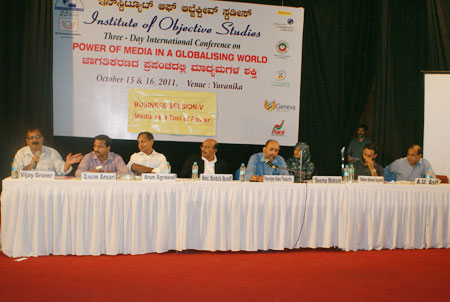
Business Session-V
L-R: Mr. Vijay Grover, Bureau Chief – South, News X; Mr. Qasim Ansari, ETV Urdu, New Delhi; Mr. Arun Agarwal, Financial Activist, Bangalore; Mr. Mohd. Obaidulla Sharieff, Editor-in-Chief, The Daily Pasban, Bangalore; Mr. Paranjoy Guha Thakurta, Independent Journalist-Film Maker, New Delhi; Ms. Seema Mohsin, Freelance Journalist, Bangalore; Mr. Vikhar Ahmed Sayeed, Journalist, Frontline; Mr. A. U. Asif, Senior Journalist, New Delhi

VALEDICTORY SESSION
L-R: Mr. Aga Sultan, Joint Convenor; Dr. M. Manzoor Alam, Chairman, IOS, New Delhi; Justice Markandey Katju, Chairman, Press Council of India; Prof. Z. M. Khan, Secretary General, IOS, New Delhi; Mr. Mohd. Obaidulla Sharieff, Editor-in-Chief, The Daily Pasban, Bangalore and Convenor
The crowning moment of the conference came when the newly-appointed Chairman of the Press Council of India, Justice Markanday Katju, got up to deliver his valedictory speech.
Justice Katju asked the media not to attach every bomb blast or other such terrorist act immediately, automatically and reflexively with a particular group without proper investigation.
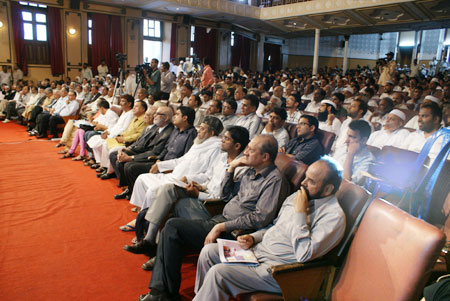
A view of audience at Sir Puttanna Chetty Town Hall, Bangalore
Merely on the basis of some mischievous SMS message, the media jumped to conclusion and attributed everything to Lashkar-e-Toiba or Indian Mujahideen, thus bringing the entire Muslim community under suspicion.
He regretted that such behaviour spread fear and hatred, and innocent people were arrested as the real culprits got away. The media, instead of focusing on public issues like poverty, inflation and unemployment, was focused on fashion shows and cricket.
Citing an example of media blackmail, he said a famous lady was asked to pay Rs. 18 lakh for having a favourable report on election. If she refused to pay, they would give an adverse report. This was a version of “paid news,” he said.
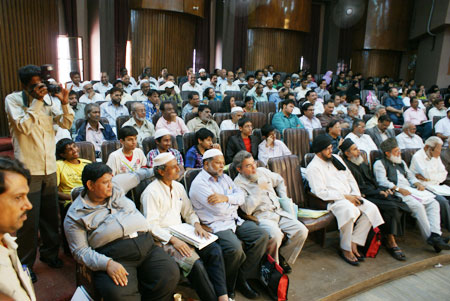
An other view of audience at Yuvanika, Bangalore
He also condemned honour killing as a heinous crime and said he had given clear and stern judgment against it.
He asked the media to decide whether they wanted to be “with the people, or against the people.” He said the European media helped the people fight the feudal system and end it in the 17th century.
In his address Dr Mohammad Manzoor Alam said that the three-day proceedings would help to give a positive direction to Indian journalism. He recalled Justice Katju’s participation in the first conference of the series in New Delhi on April 17 this year. He expected that Justice Katju would steer the media on a more constructive course during his tenure as the Chairman of Press Council of India.
Fifteen persons were awarded by the IOS on this occasion.
A vote of thanks was presented by social activist Mr Agha Sultan.
The Institute of Objective Studies, New Delhi has successfully concluded a three-day International Conference on “Power of Media in a Globalising World” from 14-16 October, 2011 in Bangalore. It could be considered as one of the most relevant and seamlessly organized conferences of the Institute. A wide spectrum of academics, researchers, practicing journalists, policy planners, bureaucrats, political leaders, social activists etc. participated in and enriched the deliberations of the conference. In its concluding session, the conference has adopted the following resolutions:
- that importance and power of media calls for showing adequate concern to work for developing institutions, strategies, and skills for the utilization of the power of media in all areas of knowledge, development and peace.
- that the IOS should build public advocacy for the establishment of an autonomous Constitutionally-created institution, on the lines of the Election Commission and CAG, to safeguard, regulate, monitor media affairs, with a special focus on media rights, ethics and minority rights.
- that there should be a mechanism in place to work in the fields of media for protection and portrayal of minority affairs and rights with proper emphasis and thrust at proper times.
- that the IOS should develop an action plan to bring all minority-friendly media related institutions closer to each other and create synergy for collaboration and coordination in related fields.
- that interactions with the media should offer correct views, with an aim to sensitize the media, with the dissemination of ideas that reflect democratic aspirations and hopes of all Indians
- that there is need to promote extensive use of the Internet, facebook and twitter etc. to convey the minority point of view and to counter the misinformation against the minorities
- that all possible quarters are to be roped in to fight against ideologies of fear and mechanism of hate literature. Cult of violence has to be fought in all possible ways.
- that an action plan should be prepared to encourage and augment creation of suitable media instrumentalities to consistently look after minority interests and affairs.
- that there would be the establishment of the “IOS Centre for Media and Regional Studies” in Bangalore in the near future.
|